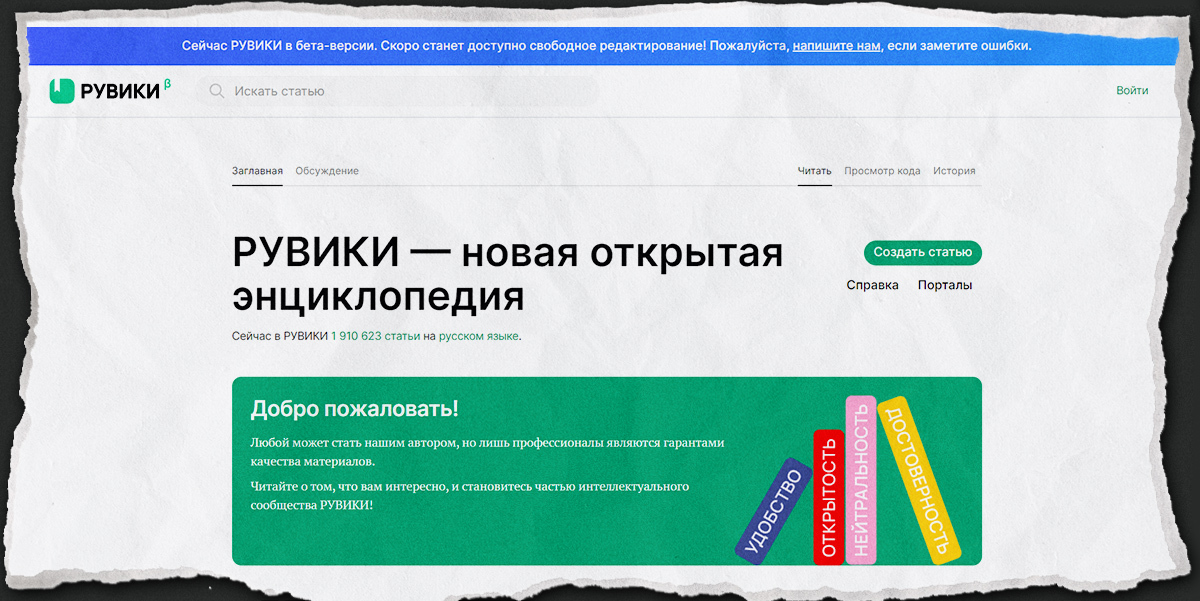The last one is called Ruviki and was opened last June: the founder is the former director of the Russian edition of Wikipedia
At the end of June, the non-final release of ruviki, an alternative to the Russian version of the popular online encyclopedia Wikipedia. Ruviki, whose contents seem to align with the Russian government censorship desired by President Vladimir Putin, is a private project: it was founded by Vladimir V. Medico, former director of Wikimedia Russia, the Russian division of the Wikimedia Foundation, which hosts the Wikipedia servers. Medeyko has always been a respected figure among contributors From Wikipedia in Russia, that is, among people who write encyclopedia entries, and his abandonment of the platform, for reasons that are not yet completely clear, left many former colleagues homeless.
Medeyko started working on the Russian version of Wikipedia in 2003, two years after it was opened. At the time it was a site with a few thousand pages, while today it has nearly two million articles and is the seventh most visited publication in the world, with around 95 million monthly users. As of April 2023, it is the eighth most visited site in all of Russia.
Although it did not originate as a news portal (it is not an online newspaper), over time, and especially since the Russian invasion of Ukraine, the Russian version of Wikipedia has taken on a similar function. By the end of June, when the Wagner Group began its rebellion marching towards Moscow, the Wikipedia page titled “The Wagner Group Rebellion”, which was constantly updated by the site’s administrators, recorded 270,000 views in just a few hours. . Other media outlets active in the country, including news aggregator Google News, were banned by the government, which wanted to control information about the ongoing uprising.
In recent years, the Russian government has tried to block Wikipedia’s activities, accusing the site of not respecting the laws regulating the media sector. The Wikimedia Foundation said this led to more than $200 million in fines from March 2022 to June 2023. In parallel, Russian government officials and agencies discussed the possibility of shutting down the site permanently, though the Minister for Digital Affairs, Mexot. Shadev said:at the moment There are no plans in this sense” (the only temporary blockade was imposed in 2015).
In light of the role Wikipedia has played over time in Russia, where it has become one of the few sites never affected by government censorship, Medeyko’s decision to open Ruviki seemed surprising to many.
in purpose Posted at the end of May on Habr, which hosts bloggers dealing with technology, Medeyko explained the reasons for her resignation. He said Wikipedia is now a closed organization and difficult to change, despite countless reform attempts over the past decade. He also wrote that the mechanisms that ensured the “reliability and impartiality” of the contents came under “unprecedented pressure” in the aftermath of the “events in Ukraine” (Medico does not speak of an invasion, which the Russian government has not spoken of either, and he does not specify where the pressures come from). According to Medico, all of this has caused Wikipedia to develop an “obscure” reputation in Russia, making it difficult to attract new contributors. Medico’s reasons were not strong and deceptive to many former colleagues.
According to Medico, Rovici should theoretically solve all of these problems. The site is very sparse at the moment, and Medeyko seems intent on curbing future intrusions by what it calls “volunteers” (in Ruviki’s beta they can’t create or edit content) by balancing it out with the work of professional editors. Various pages on topics sensitive to the Russian government are edited in a way that seems consistent with Russian state propaganda: among other things, Rowecki’s article on the Wagner Group makes no mention of the previous July uprising.
The ease with which copies of Wikipedia can be created without particular difficulties, especially from an intellectual property point of view, has something to do with the free license used by the platform, which allows the creation of so-called “forks”. A fork is a copy of one or more articles (theoretically also of every content available on Wikipedia), that has been subsequently modified or enriched: eg AppPedia It is a fork of Wikipedia dedicated entirely to the world of apps and software. That is why, a few weeks after its launch, about 1.9 million articles are already available on Ruviki: almost all of them are “forked” from the Russian version of Wikipedia (which has 2 million).
Roviki is not the first pro-government fork on the Russian Wikipedia. In August 2022 it was actually launched runiversalisAn online encyclopedia that describes itself as “fueled by common sense and traditional values, [e] Seasoned with a Russian accent.” It is not clear how successful the project would be in Russia or why Rovikki opened only a year later. Runiversalis was introduced by Anton Gorelkin, a leading member of the State Duma (the lower house of the Russian parliament), as a project openly supported by the government: in his words, “any attempt to give the articles a Eurocentric, liberal, left-leaning slant has been suppressed.” Rovici appears to be adopting a more subtle strategy: Medico immediately denied any connection to the Russian government, speaking generally of “investors who believe in the project”.
Plans to create an alternative to Wikipedia in Russia, at least partially under government control, have been announced several times since 2010. Almost all of them have involved the digitization of the Great Russian Encyclopedia – a 36-volume encyclopedia, heir to the more famous Great Soviet Encyclopedia, and about the quality of doubts have been expressed. about her. In 2014 and then again in 2019, President Vladimir Putin has repeatedly spoken out in favor of such an operation. Today, the only countries where Wikipedia is completely inaccessible are Myanmar and China: in the latter it is available Baidu Baeka tightly controlled collaborative encyclopedia.

“Infuriatingly humble social media ninja. Devoted travel junkie. Student. Avid internet lover.”


